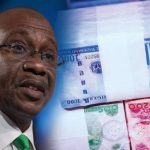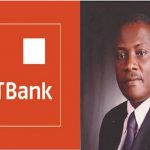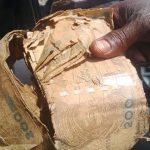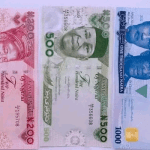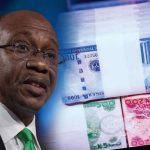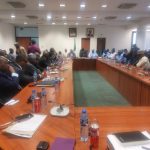Vice President Yemi Osinbajo has advised banks to use more FinTechs and money agents to help Nigerians who are having trouble receiving the new naira notes.
Osinbajo said this in Abuja during a meeting with stakeholders in the FinTech industry to explore possible ways of mitigating the hardship.
The VP said cash is needed to do various things such as paying for transport, buying foodstuff, recharge cards and many more.
He added “Parents with kids in public schools give money daily to their children for lunch, most commerce is informal, so you need cash for most things,” Prof. Osinbajo pointed out.
During the interactive session with a number of FinTech investors and ecosystem players, the Vice President said that the Central Bank of Nigeria and the commercial banks should work with all FinTechs that have mobile money agents, not just some of them, in order to reach the farthest places in the country.
According to him, “It seems to me that banks must engage their mobile money operators – FinTechs with mobile money licenses and many of them have micro-finance bank licenses now and already have a network of mobile money agents or human banks or human ATMs (as they are sometimes called) who are responsible to them and they can supervise by themselves. They can do currency swaps and open bank accounts.”
The VP spoke just as the President in a meeting with some All Progressives Congress (APC) governors at the Presidential Villa, assured the nation that the challenges are being addressed and would be solved very soon.
Speaking further about some of the concerns arising from the redesign of the new naira notes, the VP stated that “More disturbing is the fact that after depositing your old notes, there are no new notes, so people everywhere in the urban areas and rural areas simply have no money.”
The Vice President acknowledged that “There are logistical challenges that have to be addressed by the CBN and the banks, especially from the point of view of the average Nigerian and those in the hinterland who hardly use any electronic platforms.”
He also observed that while there has always been a certain failure rate in online banking and money transactions, they have become even more difficult now with the increase in the number of transactions congesting the system.
He thanked the participants at the meeting for their commitment and contributions, noting that “It has really been revealing hearing all your thoughts about what is going on, our country just simply needs to have the quality of advice that I have received, today.
“We really need to make progress even as we make efforts to deal with some of these issues confronting us today.”
Separately, some stakeholders provided substantial proposals on how to handle the country’s current situation and volunteered to assist government at all levels with the necessary expertise to overcome problem blocks.
They recommended that USSD fees and data costs be reduced, that floor pricing be eliminated by regulators, and that choke points in online transactions be relieved by eliminating some technological procedures.
Vice President Yemi Osinbajo has advised banks to use more FinTechs and money agents to help Nigerians who are having trouble receiving the new naira notes.
Osinbajo said this in Abuja during a meeting with stakeholders in the FinTech industry to explore possible ways of mitigating the hardship.
The VP said cash is needed to do various things such as paying for transport, buying foodstuff, recharge cards and many more.
He added “Parents with kids in public schools give money daily to their children for lunch, most commerce is informal, so you need cash for most things,” Prof. Osinbajo pointed out.
During the interactive session with a number of FinTech investors and ecosystem players, the Vice President said that the Central Bank of Nigeria and the commercial banks should work with all FinTechs that have mobile money agents, not just some of them, in order to reach the farthest places in the country.
According to him, “It seems to me that banks must engage their mobile money operators – FinTechs with mobile money licenses and many of them have micro-finance bank licenses now and already have a network of mobile money agents or human banks or human ATMs (as they are sometimes called) who are responsible to them and they can supervise by themselves. They can do currency swaps and open bank accounts.”
The VP spoke just as the President in a meeting with some All Progressives Congress (APC) governors at the Presidential Villa, assured the nation that the challenges are being addressed and would be solved very soon.
Speaking further about some of the concerns arising from the redesign of the new naira notes, the VP stated that “More disturbing is the fact that after depositing your old notes, there are no new notes, so people everywhere in the urban areas and rural areas simply have no money.”
The Vice President acknowledged that “There are logistical challenges that have to be addressed by the CBN and the banks, especially from the point of view of the average Nigerian and those in the hinterland who hardly use any electronic platforms.”
He also observed that while there has always been a certain failure rate in online banking and money transactions, they have become even more difficult now with the increase in the number of transactions congesting the system.
He thanked the participants at the meeting for their commitment and contributions, noting that “It has really been revealing hearing all your thoughts about what is going on, our country just simply needs to have the quality of advice that I have received, today.
“We really need to make progress even as we make efforts to deal with some of these issues confronting us today.”
Separately, some stakeholders provided substantial proposals on how to handle the country’s current situation and volunteered to assist government at all levels with the necessary expertise to overcome problem blocks.
They recommended that USSD fees and data costs be reduced, that floor pricing be eliminated by regulators, and that choke points in online transactions be relieved by eliminating some technological procedures.
Vice President Yemi Osinbajo has advised banks to use more FinTechs and money agents to help Nigerians who are having trouble receiving the new naira notes.
Osinbajo said this in Abuja during a meeting with stakeholders in the FinTech industry to explore possible ways of mitigating the hardship.
The VP said cash is needed to do various things such as paying for transport, buying foodstuff, recharge cards and many more.
He added “Parents with kids in public schools give money daily to their children for lunch, most commerce is informal, so you need cash for most things,” Prof. Osinbajo pointed out.
During the interactive session with a number of FinTech investors and ecosystem players, the Vice President said that the Central Bank of Nigeria and the commercial banks should work with all FinTechs that have mobile money agents, not just some of them, in order to reach the farthest places in the country.
According to him, “It seems to me that banks must engage their mobile money operators – FinTechs with mobile money licenses and many of them have micro-finance bank licenses now and already have a network of mobile money agents or human banks or human ATMs (as they are sometimes called) who are responsible to them and they can supervise by themselves. They can do currency swaps and open bank accounts.”
The VP spoke just as the President in a meeting with some All Progressives Congress (APC) governors at the Presidential Villa, assured the nation that the challenges are being addressed and would be solved very soon.
Speaking further about some of the concerns arising from the redesign of the new naira notes, the VP stated that “More disturbing is the fact that after depositing your old notes, there are no new notes, so people everywhere in the urban areas and rural areas simply have no money.”
The Vice President acknowledged that “There are logistical challenges that have to be addressed by the CBN and the banks, especially from the point of view of the average Nigerian and those in the hinterland who hardly use any electronic platforms.”
He also observed that while there has always been a certain failure rate in online banking and money transactions, they have become even more difficult now with the increase in the number of transactions congesting the system.
He thanked the participants at the meeting for their commitment and contributions, noting that “It has really been revealing hearing all your thoughts about what is going on, our country just simply needs to have the quality of advice that I have received, today.
“We really need to make progress even as we make efforts to deal with some of these issues confronting us today.”
Separately, some stakeholders provided substantial proposals on how to handle the country’s current situation and volunteered to assist government at all levels with the necessary expertise to overcome problem blocks.
They recommended that USSD fees and data costs be reduced, that floor pricing be eliminated by regulators, and that choke points in online transactions be relieved by eliminating some technological procedures.
Vice President Yemi Osinbajo has advised banks to use more FinTechs and money agents to help Nigerians who are having trouble receiving the new naira notes.
Osinbajo said this in Abuja during a meeting with stakeholders in the FinTech industry to explore possible ways of mitigating the hardship.
The VP said cash is needed to do various things such as paying for transport, buying foodstuff, recharge cards and many more.
He added “Parents with kids in public schools give money daily to their children for lunch, most commerce is informal, so you need cash for most things,” Prof. Osinbajo pointed out.
During the interactive session with a number of FinTech investors and ecosystem players, the Vice President said that the Central Bank of Nigeria and the commercial banks should work with all FinTechs that have mobile money agents, not just some of them, in order to reach the farthest places in the country.
According to him, “It seems to me that banks must engage their mobile money operators – FinTechs with mobile money licenses and many of them have micro-finance bank licenses now and already have a network of mobile money agents or human banks or human ATMs (as they are sometimes called) who are responsible to them and they can supervise by themselves. They can do currency swaps and open bank accounts.”
The VP spoke just as the President in a meeting with some All Progressives Congress (APC) governors at the Presidential Villa, assured the nation that the challenges are being addressed and would be solved very soon.
Speaking further about some of the concerns arising from the redesign of the new naira notes, the VP stated that “More disturbing is the fact that after depositing your old notes, there are no new notes, so people everywhere in the urban areas and rural areas simply have no money.”
The Vice President acknowledged that “There are logistical challenges that have to be addressed by the CBN and the banks, especially from the point of view of the average Nigerian and those in the hinterland who hardly use any electronic platforms.”
He also observed that while there has always been a certain failure rate in online banking and money transactions, they have become even more difficult now with the increase in the number of transactions congesting the system.
He thanked the participants at the meeting for their commitment and contributions, noting that “It has really been revealing hearing all your thoughts about what is going on, our country just simply needs to have the quality of advice that I have received, today.
“We really need to make progress even as we make efforts to deal with some of these issues confronting us today.”
Separately, some stakeholders provided substantial proposals on how to handle the country’s current situation and volunteered to assist government at all levels with the necessary expertise to overcome problem blocks.
They recommended that USSD fees and data costs be reduced, that floor pricing be eliminated by regulators, and that choke points in online transactions be relieved by eliminating some technological procedures.
Vice President Yemi Osinbajo has advised banks to use more FinTechs and money agents to help Nigerians who are having trouble receiving the new naira notes.
Osinbajo said this in Abuja during a meeting with stakeholders in the FinTech industry to explore possible ways of mitigating the hardship.
The VP said cash is needed to do various things such as paying for transport, buying foodstuff, recharge cards and many more.
He added “Parents with kids in public schools give money daily to their children for lunch, most commerce is informal, so you need cash for most things,” Prof. Osinbajo pointed out.
During the interactive session with a number of FinTech investors and ecosystem players, the Vice President said that the Central Bank of Nigeria and the commercial banks should work with all FinTechs that have mobile money agents, not just some of them, in order to reach the farthest places in the country.
According to him, “It seems to me that banks must engage their mobile money operators – FinTechs with mobile money licenses and many of them have micro-finance bank licenses now and already have a network of mobile money agents or human banks or human ATMs (as they are sometimes called) who are responsible to them and they can supervise by themselves. They can do currency swaps and open bank accounts.”
The VP spoke just as the President in a meeting with some All Progressives Congress (APC) governors at the Presidential Villa, assured the nation that the challenges are being addressed and would be solved very soon.
Speaking further about some of the concerns arising from the redesign of the new naira notes, the VP stated that “More disturbing is the fact that after depositing your old notes, there are no new notes, so people everywhere in the urban areas and rural areas simply have no money.”
The Vice President acknowledged that “There are logistical challenges that have to be addressed by the CBN and the banks, especially from the point of view of the average Nigerian and those in the hinterland who hardly use any electronic platforms.”
He also observed that while there has always been a certain failure rate in online banking and money transactions, they have become even more difficult now with the increase in the number of transactions congesting the system.
He thanked the participants at the meeting for their commitment and contributions, noting that “It has really been revealing hearing all your thoughts about what is going on, our country just simply needs to have the quality of advice that I have received, today.
“We really need to make progress even as we make efforts to deal with some of these issues confronting us today.”
Separately, some stakeholders provided substantial proposals on how to handle the country’s current situation and volunteered to assist government at all levels with the necessary expertise to overcome problem blocks.
They recommended that USSD fees and data costs be reduced, that floor pricing be eliminated by regulators, and that choke points in online transactions be relieved by eliminating some technological procedures.
Vice President Yemi Osinbajo has advised banks to use more FinTechs and money agents to help Nigerians who are having trouble receiving the new naira notes.
Osinbajo said this in Abuja during a meeting with stakeholders in the FinTech industry to explore possible ways of mitigating the hardship.
The VP said cash is needed to do various things such as paying for transport, buying foodstuff, recharge cards and many more.
He added “Parents with kids in public schools give money daily to their children for lunch, most commerce is informal, so you need cash for most things,” Prof. Osinbajo pointed out.
During the interactive session with a number of FinTech investors and ecosystem players, the Vice President said that the Central Bank of Nigeria and the commercial banks should work with all FinTechs that have mobile money agents, not just some of them, in order to reach the farthest places in the country.
According to him, “It seems to me that banks must engage their mobile money operators – FinTechs with mobile money licenses and many of them have micro-finance bank licenses now and already have a network of mobile money agents or human banks or human ATMs (as they are sometimes called) who are responsible to them and they can supervise by themselves. They can do currency swaps and open bank accounts.”
The VP spoke just as the President in a meeting with some All Progressives Congress (APC) governors at the Presidential Villa, assured the nation that the challenges are being addressed and would be solved very soon.
Speaking further about some of the concerns arising from the redesign of the new naira notes, the VP stated that “More disturbing is the fact that after depositing your old notes, there are no new notes, so people everywhere in the urban areas and rural areas simply have no money.”
The Vice President acknowledged that “There are logistical challenges that have to be addressed by the CBN and the banks, especially from the point of view of the average Nigerian and those in the hinterland who hardly use any electronic platforms.”
He also observed that while there has always been a certain failure rate in online banking and money transactions, they have become even more difficult now with the increase in the number of transactions congesting the system.
He thanked the participants at the meeting for their commitment and contributions, noting that “It has really been revealing hearing all your thoughts about what is going on, our country just simply needs to have the quality of advice that I have received, today.
“We really need to make progress even as we make efforts to deal with some of these issues confronting us today.”
Separately, some stakeholders provided substantial proposals on how to handle the country’s current situation and volunteered to assist government at all levels with the necessary expertise to overcome problem blocks.
They recommended that USSD fees and data costs be reduced, that floor pricing be eliminated by regulators, and that choke points in online transactions be relieved by eliminating some technological procedures.
Vice President Yemi Osinbajo has advised banks to use more FinTechs and money agents to help Nigerians who are having trouble receiving the new naira notes.
Osinbajo said this in Abuja during a meeting with stakeholders in the FinTech industry to explore possible ways of mitigating the hardship.
The VP said cash is needed to do various things such as paying for transport, buying foodstuff, recharge cards and many more.
He added “Parents with kids in public schools give money daily to their children for lunch, most commerce is informal, so you need cash for most things,” Prof. Osinbajo pointed out.
During the interactive session with a number of FinTech investors and ecosystem players, the Vice President said that the Central Bank of Nigeria and the commercial banks should work with all FinTechs that have mobile money agents, not just some of them, in order to reach the farthest places in the country.
According to him, “It seems to me that banks must engage their mobile money operators – FinTechs with mobile money licenses and many of them have micro-finance bank licenses now and already have a network of mobile money agents or human banks or human ATMs (as they are sometimes called) who are responsible to them and they can supervise by themselves. They can do currency swaps and open bank accounts.”
The VP spoke just as the President in a meeting with some All Progressives Congress (APC) governors at the Presidential Villa, assured the nation that the challenges are being addressed and would be solved very soon.
Speaking further about some of the concerns arising from the redesign of the new naira notes, the VP stated that “More disturbing is the fact that after depositing your old notes, there are no new notes, so people everywhere in the urban areas and rural areas simply have no money.”
The Vice President acknowledged that “There are logistical challenges that have to be addressed by the CBN and the banks, especially from the point of view of the average Nigerian and those in the hinterland who hardly use any electronic platforms.”
He also observed that while there has always been a certain failure rate in online banking and money transactions, they have become even more difficult now with the increase in the number of transactions congesting the system.
He thanked the participants at the meeting for their commitment and contributions, noting that “It has really been revealing hearing all your thoughts about what is going on, our country just simply needs to have the quality of advice that I have received, today.
“We really need to make progress even as we make efforts to deal with some of these issues confronting us today.”
Separately, some stakeholders provided substantial proposals on how to handle the country’s current situation and volunteered to assist government at all levels with the necessary expertise to overcome problem blocks.
They recommended that USSD fees and data costs be reduced, that floor pricing be eliminated by regulators, and that choke points in online transactions be relieved by eliminating some technological procedures.
Vice President Yemi Osinbajo has advised banks to use more FinTechs and money agents to help Nigerians who are having trouble receiving the new naira notes.
Osinbajo said this in Abuja during a meeting with stakeholders in the FinTech industry to explore possible ways of mitigating the hardship.
The VP said cash is needed to do various things such as paying for transport, buying foodstuff, recharge cards and many more.
He added “Parents with kids in public schools give money daily to their children for lunch, most commerce is informal, so you need cash for most things,” Prof. Osinbajo pointed out.
During the interactive session with a number of FinTech investors and ecosystem players, the Vice President said that the Central Bank of Nigeria and the commercial banks should work with all FinTechs that have mobile money agents, not just some of them, in order to reach the farthest places in the country.
According to him, “It seems to me that banks must engage their mobile money operators – FinTechs with mobile money licenses and many of them have micro-finance bank licenses now and already have a network of mobile money agents or human banks or human ATMs (as they are sometimes called) who are responsible to them and they can supervise by themselves. They can do currency swaps and open bank accounts.”
The VP spoke just as the President in a meeting with some All Progressives Congress (APC) governors at the Presidential Villa, assured the nation that the challenges are being addressed and would be solved very soon.
Speaking further about some of the concerns arising from the redesign of the new naira notes, the VP stated that “More disturbing is the fact that after depositing your old notes, there are no new notes, so people everywhere in the urban areas and rural areas simply have no money.”
The Vice President acknowledged that “There are logistical challenges that have to be addressed by the CBN and the banks, especially from the point of view of the average Nigerian and those in the hinterland who hardly use any electronic platforms.”
He also observed that while there has always been a certain failure rate in online banking and money transactions, they have become even more difficult now with the increase in the number of transactions congesting the system.
He thanked the participants at the meeting for their commitment and contributions, noting that “It has really been revealing hearing all your thoughts about what is going on, our country just simply needs to have the quality of advice that I have received, today.
“We really need to make progress even as we make efforts to deal with some of these issues confronting us today.”
Separately, some stakeholders provided substantial proposals on how to handle the country’s current situation and volunteered to assist government at all levels with the necessary expertise to overcome problem blocks.
They recommended that USSD fees and data costs be reduced, that floor pricing be eliminated by regulators, and that choke points in online transactions be relieved by eliminating some technological procedures.




